If you’re searching for a delicious and nutritious vegetable to enhance your guinea pig’s diet, you’re asking, “Can guinea pigs eat asparagus?” The answer is YES, but only in moderation!
As a devoted guinea pig caretaker, I’ve consulted experts, read extensively, and delved deep into the details to uncover the truth about asparagus for our furry friends.
In this article, I’ll share my comprehensive knowledge about asparagus, its potential risks, important considerations, and the most effective ways to include it in your guinea pig’s diet.
Embark on this journey to learn everything there is to know about asparagus for guinea pigs and unlock the secrets of this versatile vegetable!
Table of Contents
Key Takeaways
- Guinea pigs can eat asparagus in moderation, as it can be a healthy addition to their diverse diet of vegetables.
- Introducing asparagus too rapidly or feeding excessive amounts may pose risks to your guinea pig’s health.
- Monitor your guinea pig’s response to asparagus to ensure it doesn’t cause any adverse reactions or digestive issues.
Great – your guinea can eat asparagus, but is it safe? Scroll to find out!
Is It Safe For Guinea Pigs To Eat Asparagus?
Suppose just the sound of chopping fresh vegetables can cause excited “wheeking” noises from your cavy.
In that case, you’ll be happy to learn that raw asparagus can be added to your arsenal of green treats.
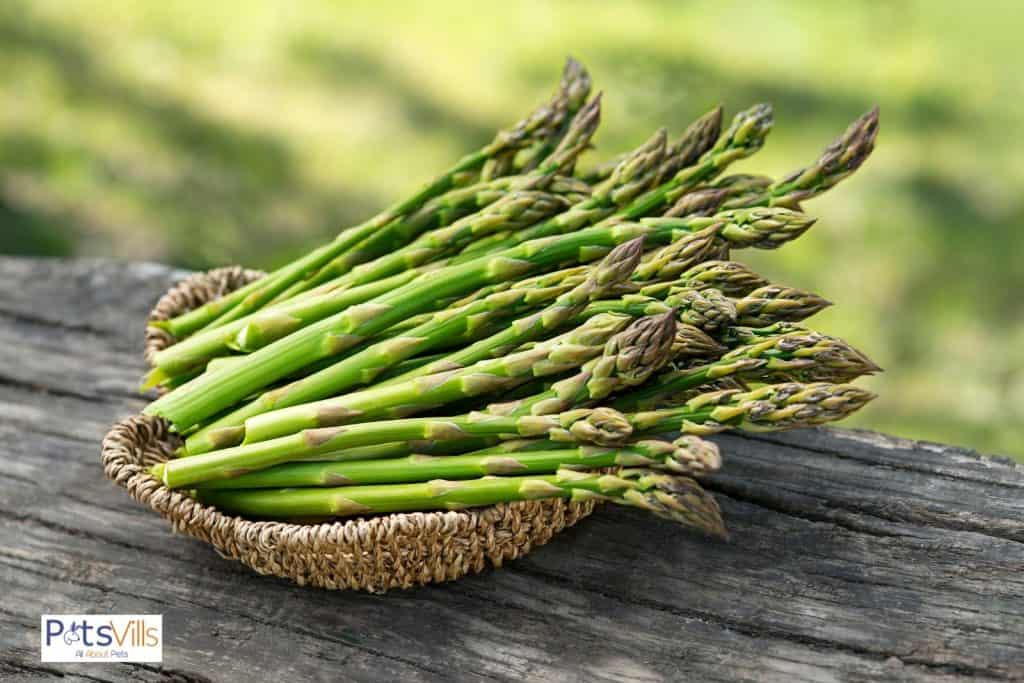
According to Laurie Hess, DVM, and Rick Axelson, DVM, in their article on “Feeding Guinea Pigs,” guinea pigs are true herbivores that thrive on a variety of fresh, well-washed, leafy greens or colored vegetables [5].
So yes, this includes asparagus!
But here’s what you need to know: Although asparagus is packed with essential nutrients, vitamins, and antioxidants, it contains moderate levels of oxalic acid.
To reduce any negative reactions, begin with small amounts and gradually increase the serving size. And don’t forget to Incorporate a variety of vegetables for a balanced diet (more on this later).
Remember, when introducing any new food, proceed with caution.
More specifically, avoid feeding excessive amounts of asparagus or adding it too quickly to their otherwise healthy diets, which can lead to various issues.
In the next section, I’ll reveal the truth about which part of the plant they can eat (what to avoid)…
However, there are some dangers in feeding too much asparagus or adding it to their diet too quickly. So it’s best to take an in-depth look at asparagus for guinea pigs.
What Part of the Asparagus Plant Can Your Guinea Pig Eat?
Cavies are usually okay with the woody asparagus ends near the bottom of the plant. In fact, the fibrous texture of the ends is good for their dental health as it encourages more chewing.
Remember, cavys’ teeth are constantly “erupting” or growing, so they need to wear them down.
The asparagus spear comprises the asparagus stem, and the tip is also good for them to eat. Cavies tend to love asparagus tips.
But before you feed these treats, make sure they are fresh and have not changed color.
Be careful to wash all fresh food to remove pesticides, and always remove any uneaten asparagus within a few hours before it goes off.
The asparagus fruit is one part of the plant that a cavy should never eat.
Eating this can lead to food poisoning as the fruits are highly toxic and disturb their delicate system, causing upset stomachs and diarrhea for our pocket pets.
How Much Asparagus Can a Guinea Pig Eat?
In general, a guinea pig should be offered about a cup of mixed fresh vegetables per day. Of that, about a quarter of the cup can be chopped asparagus.
This is usually safe for a guinea pig, but keep in mind that asparagus is high in phosphorus and calcium and has a moderate amount of oxalic acid.
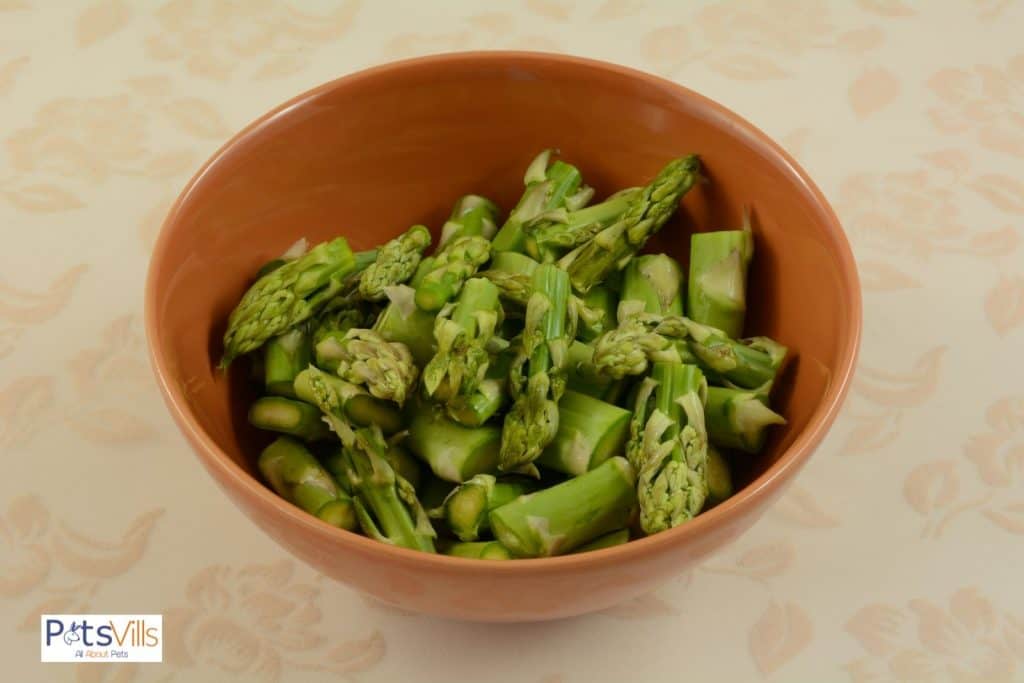
All of these can result in different kinds of kidney stones or uroliths. So try to keep the overall amount of calcium, phosphorus, and oxalic acid in mind when you add asparagus to other fresh food.
READ MORE: Can Guinea Pigs Eat Raw Potatoes?
Can I Feed My Guinea Pig Asparagus Daily?
Because of the high levels of calcium, phosphorus, and other nutrients in asparagus, you don’t want to feed asparagus daily.
The bulk of a cavy’s diet should be pretty low in nutrients, such as timothy hay, and too many can cause a build-up in their bodies and create health concerns.
Therefore, a nutrient-dense vegetable such as asparagus should instead be given as a treat once or twice a week.
As perennial plants that are quite intensive to grow, asparagus is also more expensive than most vegetables, so feeding it less often may be more cost-effective.
Can Baby Guinea Pigs Eat Asparagus?
Baby guinea pigs under six months should not eat asparagus. They need a carefully formulated diet of their mother’s milk and hay. Only introduce asparagus when they are adults.
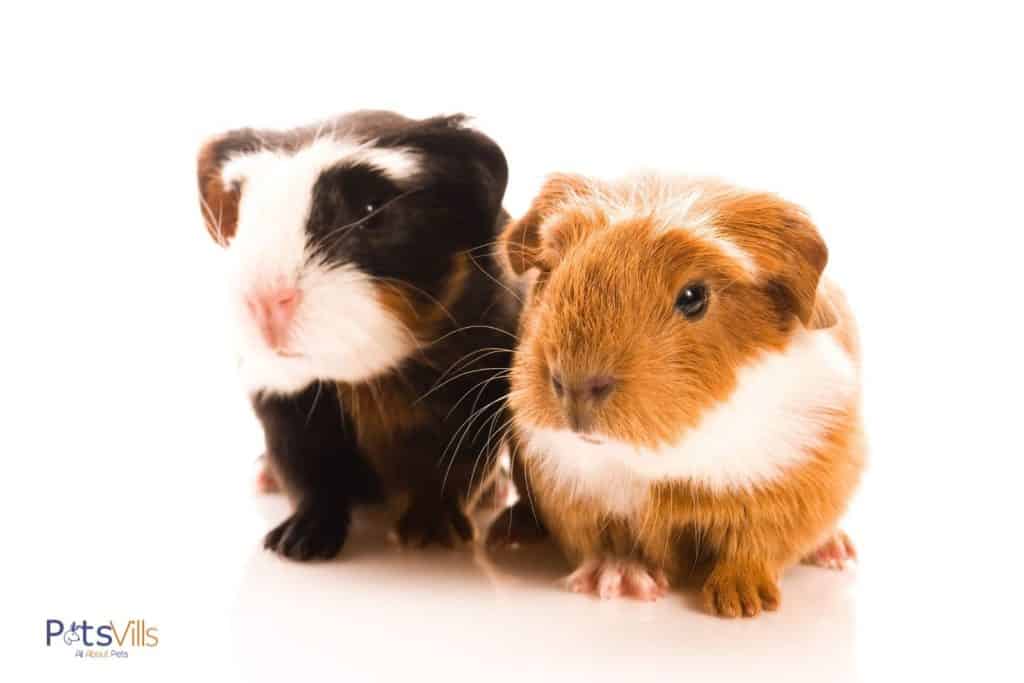
What Kind of Asparagus Can I Feed My Guinea Pig?
There are several types of asparagus you can choose to feed your guinea pig.
The green asparagus, however, is the most common type and certainly the type most people know all too well.
It’s also the type I’ll venture into in this article. But don’t be fooled: the green asparagus isn’t the only type.
There is also white asparagus that is grown entirely underground to prevent chlorophyll from forming. If you are lucky enough to find it, white asparagus is a perfectly good occasional treat.
It also has a milder taste than the standard green type.
Next is the purple asparagus. Cavies seem to love this one more, and they also happen to have higher sugar content.
Better yet, this type also has high levels of the antioxidant anthocyanin. Anthocyanin has several notable health benefits:
- It is antidiabetic
- Anti-microbial
- Anti-inflammatory
- And helps to prevent obesity.
All types of asparagus are fine for your cavy so long as you limit the portion size and only feed it from time to time.
Check out this video to learn more about this veggie:
Should I Feed Guinea Pig Asparagus Raw, Cooked, or Canned?
Stick with raw asparagus. Sadly, cavies cannot digest cooked asparagus or any other cooked food.
Besides, the extra oils, garlic, and onions often that often come with baked asparagus can be harmful and cause digestive troubles.
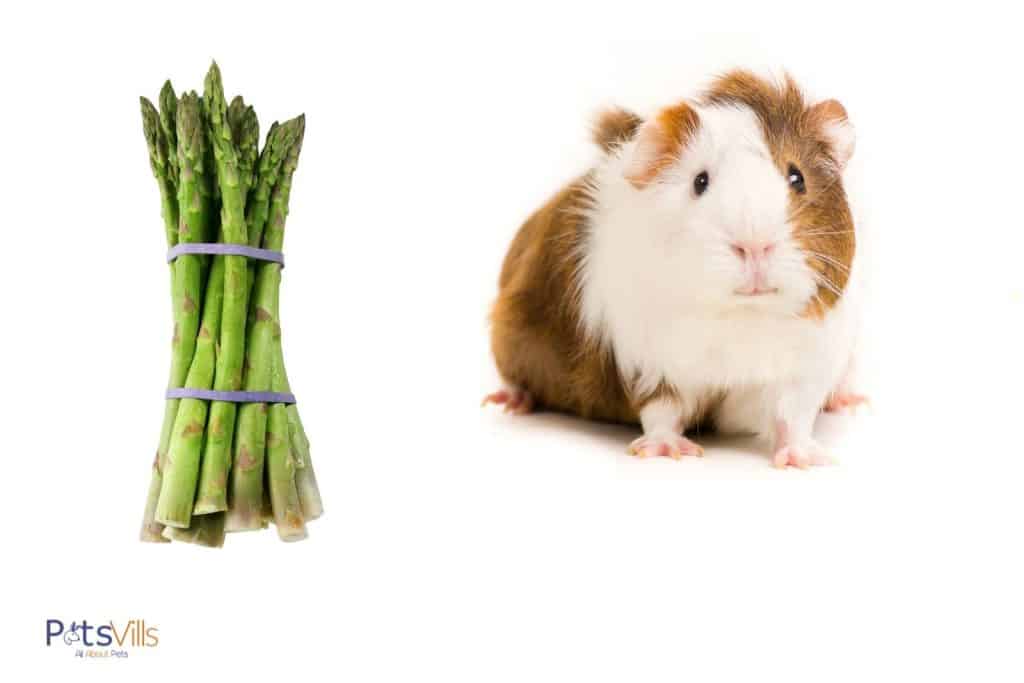
Cavies should also not be given any frozen asparagus (or other frozen foods), as it may have pesticides.
At the same time, canned asparagus is steeped in preservatives, or brine is also bad for their health. Therefore, only fresh, raw asparagus is a viable option for a healthy adult cavy.
Health Benefits of Asparagus
Let’s dive into this summary table, outlining the key health benefits and potential risks of asparagus for our adorable guinea pigs!
| Health Benefits of Asparagus | Risks of Feeding Asparagus |
|---|---|
| Calcium to Phosphorus Ratio: Asparagus has a healthy calcium-to-phosphorus ratio of 0.46:1, which can help to prevent kidney stones. | Allergic Reaction: Guinea pigs can have allergic reactions to new foods, including asparagus. Symptoms can include itchy skin, sneezing, wheezing, diarrhea, or trouble breathing. |
| Essential Minerals: Asparagus contains potassium, magnesium, zinc, and selenium, all of which contribute to various aspects of a guinea pig’s health. | Oxalic Acid: Asparagus contains oxalic acid, which can be harmful to guinea pigs if consumed in excess. Experts recommend no more than 50mg a day. |
| Vitamin C & Other Essential Vitamins: Asparagus contains vitamin C, as well as vitamins A, B5, and K, which are crucial for a guinea pig’s health. However, asparagus alone does not contain enough vitamin C to prevent a deficiency. | Pesticides: Commercial vegetables like asparagus could have residual pesticides or bacteria. Always wash and scrub vegetables thoroughly before feeding them to your guinea pig. |
| Antioxidants: Asparagus is loaded with antioxidants like vitamins C and E, polyphenols, and glutathione, which can fight potential health issues such as free radicals and oxidative stress. | Diarrhea and Stomach Problems: Too many green vegetables, including asparagus, can cause diarrhea or upset stomach in guinea pigs. Always introduce new foods slowly and in moderation. |
| Fiber Content: Asparagus is high in fiber, which is excellent for a guinea pig’s digestive system and essential for maintaining a healthy weight. | |
| Low Sugar and Calories: Asparagus is low in calories and sugar, which can help guinea pigs maintain a steady blood sugar level and appropriate body weight. |
Calcium to Phosphorus Ratio
Guinea pigs fed diets too high in calcium and phosphorus are likely to develop kidney stones. These may be either calcium phosphate, calcium carbonate, or calcium oxalate [1].
One study shows that feeding cavies on a diet that is less than 0.5% calcium can bring the incidence of kidney stones down to less than 10% [2].
This isn’t to say that cavies should get no calcium since it is essential for bone health, nerves, muscle contractions, and blood clotting, but it should be limited.
One stalk of asparagus contains about 2.9 mg of calcium and 6.2 mg of phosphorus. This is important because the ratio of calcium to phosphorus in your guinea pig’s diet is also crucial.
It is generally thought that the ideal calcium-to-phosphorus ratio doesn’t exceed 1.5:1. Luckily, the calcium-to-phosphor ratio for asparagus is only 0.46:1.
This means by feeding vegetables higher in calcium, such as cilantro, chard, or celery, you can balance the overall ratio out and maintain your cavy’s overall urinary tract health.
READ MORE: Can Guinea Pigs Eat Celery?
Essential Minerals
Potassium and magnesium seem to interact with phosphorus and calcium content in the guinea pig’s body.
In fact, they may prevent the effects of excess phosphorus. Potassium helps to regulate fluids, muscle contractions, and nerves.
Potassium may also help to regulate blood sugar levels, keep bones healthy, and prevent kidney stones.
Magnesium is vital for muscle and nerve support and may also increase energy levels.
Meanwhile, zinc and selenium are powerful immune system boosters and can keep your cavy fighting fit.
Zinc also helps in wound healing and reduces inflammation, while selenium protects against heart disease, cancer and acts as an antioxidant.
Vitamin C & Other Essential Vitamins
Vitamin C is a vital vitamin for your guinea pig’s health. Like humans, cavies can’t produce their own and need this to be supplemented into their diet.
A lack of vitamin C can lead to scurvy, which can interfere with the body’s blood clotting ability and collagen manufacture and create problems for the skin and joints.
Vitamin C also helps the absorption of iron, which makes for healthy blood.
Because asparagus does not contain enough to avoid a vitamin C deficiency, your cavy will still need a supplement. However, fresh vegetables like asparagus can help maintain the levels of vitamin C in their bodies.
Asparagus is also a good source of pantothenic acid, or vitamin B5, which is crucial for your guinea pig’s metabolism, and it contains vitamin A, which is fantastic for your cavy’s eye health.
Finally, asparagus is an excellent source of vitamin K. This is necessary to create prothrombin. This amino acid aids blood clotting and bone metabolism. Vitamin K also regulates blood calcium levels.
Antioxidants
Asparagus is loaded with antioxidants that fight potential health issues such as free radicals and oxidative stress.
Other than vitamin C, asparagus also has vitamin E, which is excellent for the skin and lowers inflammation in the body.
It also contains polyphenols and glutathione. One major bonus is that asparagus is rich in flavonoids such as quercetin, kaempferol, and isorhamnetin.
Additionally, asparagus contains flavonoids like quercetin, kaempferol, and isorhamnetin, which can help your cavy fight against cancer, viruses, high blood pressure, and inflammation.
By incorporating asparagus into your guinea pig’s diet, you can help support their overall health and well-being.
These can help your cavy fight cancer, viruses, high blood pressure, and inflammation.
Fiber Content
Asparagus is relatively high in fiber, which is excellent for cavies. Guinea pigs must have a high-fiber diet, which is why most of their food should come from low-calcium hay.
Fiber manages a healthy digestive system and balances the gut bacteria.
The extra chewing that high-fiber foods need also wear down your cavy’s teeth. A high-fiber diet is also essential to maintain a healthy weight.
Low Sugar and Calories
Finally, asparagus is low in calories and sugar. This is crucial to prevent blood sugar spikes in your cavy’s system and to help them maintain appropriate body weight.
Keeping a guinea pig’s blood sugar level steady is essential because they are genetically predisposed to diabetes.
In general, their diets should be very low in carbohydrates and sugars, and they should be encouraged to be active.
Keeping your guinea pig from becoming overweight or obese can prevent a variety of health issues later in their life. The high protein in asparagus is also great means of building lean muscle mass.
Here’s a video of some major benefits of asparagus:
Risks of Feeding Asparagus to Guinea Pigs
As much as asparagus has many benefits for cavies, remember that it should only be fed in moderation. There are several potential risks that asparagus may have for your guinea pig:
Allergic Reaction
When introducing your cavy to a new food, always be on the lookout for an allergic reaction.
Start with one small piece of asparagus, and then monitor your cavy closely for any signs that it does not agree with them. This may include:
- Itchy skin
- sneezing
- wheezing or trouble breathing
- diarrhea
If your pet shows any of these symptoms, stop feeding asparagus immediately. If the symptoms persist, be sure to take your pet to the vet.
Oxalic Acid
Just like phosphorus and calcium needs to be monitored, so does oxalic acid. This is a chemical found in most plants and tends to increase as the plants get older.
Experts recommend that guinea pigs eat no more than 50 mg of oxalic acid a day, or it might result in uroliths and even death.
Unfortunately, asparagus is moderately high in oxalic acid, containing about 13 grams per 100 grams. This is one reason asparagus should not be fed every day.
Pesticides
Any commercial vegetable should always be washed and scrubbed under running cold water to remove residual pesticides and bacteria that could poison your cavy.
Thankfully, asparagus is usually safe and was found to be one of the top 15 crops with the least pesticides in 2021 [3].
Nevertheless, all crops should be treated with care for possible contamination, not just by pesticides but by bacteria such as Salmonella.
Always make good hygiene part of your food handling routine for both human food and guinea pig food.
Diarrhea and Stomach Problems
Too much green vegetables, such as asparagus or fruit, can cause diarrhea in guinea pigs. It can also upset their tummies if they are not used to it.
Make sure to introduce any new vegetable slowly and never allow them more than a cup of leafy greens a day.
FAQs
1. What foods cause bladder stones in guinea pigs?
Foods high in calcium or oxalates, like spinach or beet greens, may contribute to bladder stones in guinea pigs and should be monitored carefully.
2. What should I feed my guinea pig daily?
Provide water, hay, pellets, and around one cup of fresh veggies and fruits daily. Ensure intake of 10-50 mg of vitamin C to prevent scurvy, using supplements if needed.
3. What fresh food can my guinea pig eat?

Primarily feed leafy greens like romaine, red lettuce, cilantro, parsley, and kale. Avoid iceberg lettuce, and offer other safe fruits and vegetables in moderation.
4. What foods kill guinea pigs?
Avoid processed human junk food, chocolate, and citrus fruits for guinea pigs.
Also, keep them away from onions, garlic, shallots, leeks, and chives.
Conclusion
As a guinea pig owner, your worries about “Can guinea pigs eat asparagus” is now settled:
Guinea pigs can eat asparagus, but it should be fed in moderation. Yes, this means a few stalks 1-2 times a week.
Asparagus offers numerous health benefits for adult guinea pigs, but pet owners should also be aware of the potential drawbacks and monitor their guinea pig’s daily diet carefully.
By maintaining a well-balanced diet and providing plenty of fresh, clean water, guinea pigs can thrive as delightful pocket pets for many years to come.
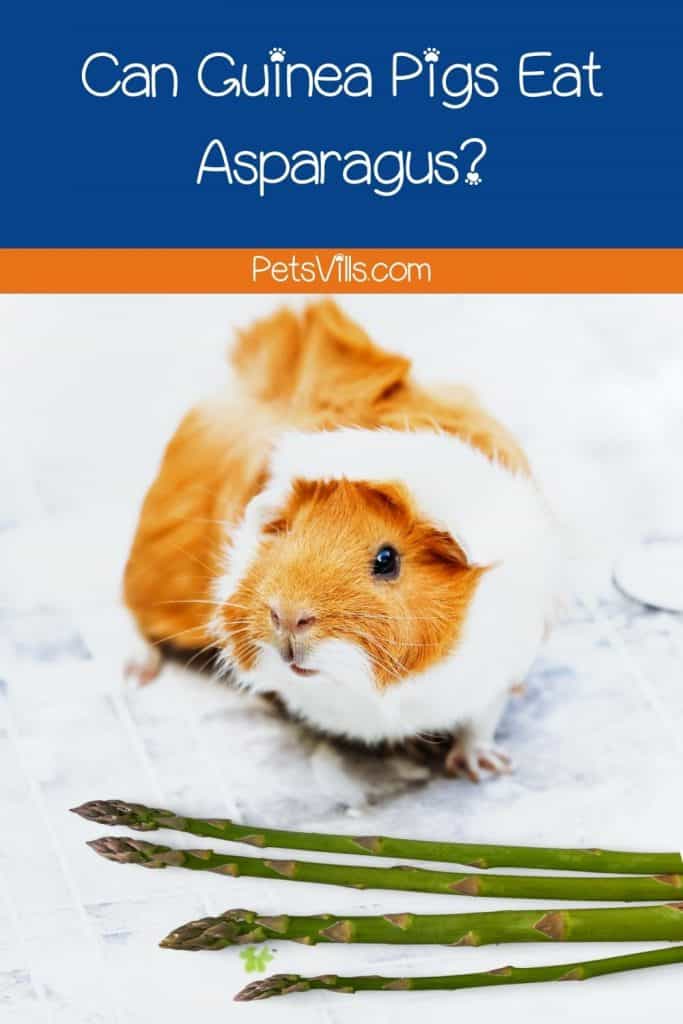
What do you think of asparagus for guinea pigs? Please share your thoughts below!
References:
1. Vet TGP. Bladder Stones in Guinea Pigs [Internet]. Theguineapigvet. 2019. Available from: https://www.theguineapigvet.co.uk/post/bladder-stones-in-guinea-pigs
2. Hogan AG, Regan WO, House WB. Calcium Phosphate Deposits in Guinea Pigs and the Phosphorus Content of the Diet. The Journal of Nutrition [Internet]. 1950 [cited 2023 May 7];41:203–13. Available from: https://academic.oup.com/jn/article-abstract/41/2/203/4727926
3. Environmental Working Group. Clean FifteenTM Conventional Produce with the Least Pesticides [Internet]. Ewg.org. 2019. Available from: https://www.ewg.org/foodnews/clean-fifteen.php
4. Bjornebo, Heather. 2016. “VITAMIN c RECOMMENDATIONS for GUINEA PIGS | Arizona Exotics | -Guinea Pigs Resources.” Azeah.com. August 14, 2016. https://azeah.com/guinea-pigs/vitamin-c-recommendations-guinea-pigs.
5. Hess L, Axelson R. Feeding Guinea Pigs [Internet]. vca_corporate. Available from: https://vcahospitals.com/know-your-pet/guinea-pigs-feeding

Andreea is a very passionate content creator and her purpose is to provide you with the most interesting articles, while constantly discovering new facts. She’s been freelance writing for the past five years and has created numerous articles and educational materials while managing her own mom blog.
Read her Latest Articles
Find her on
FACEBOOK AND Instagram


